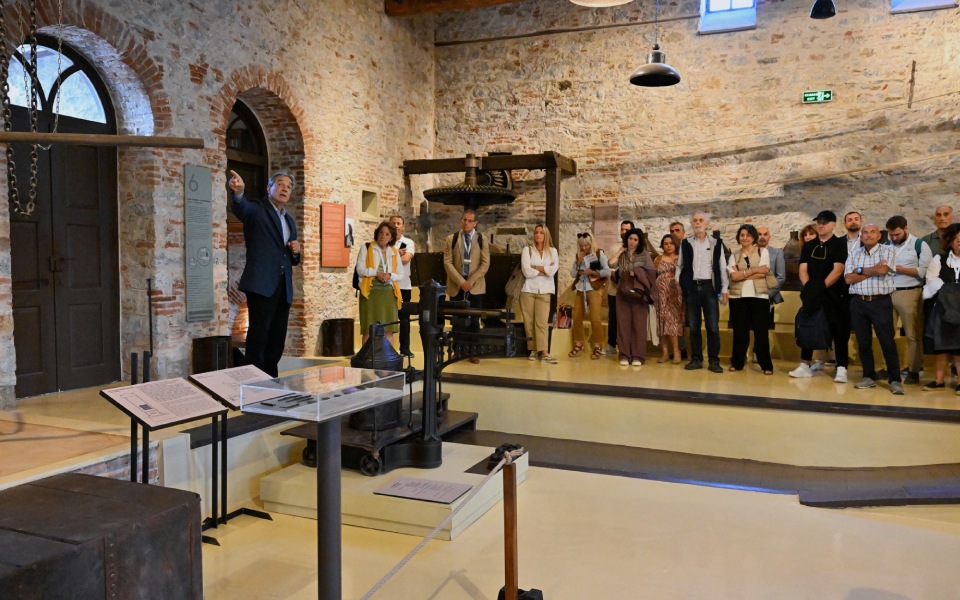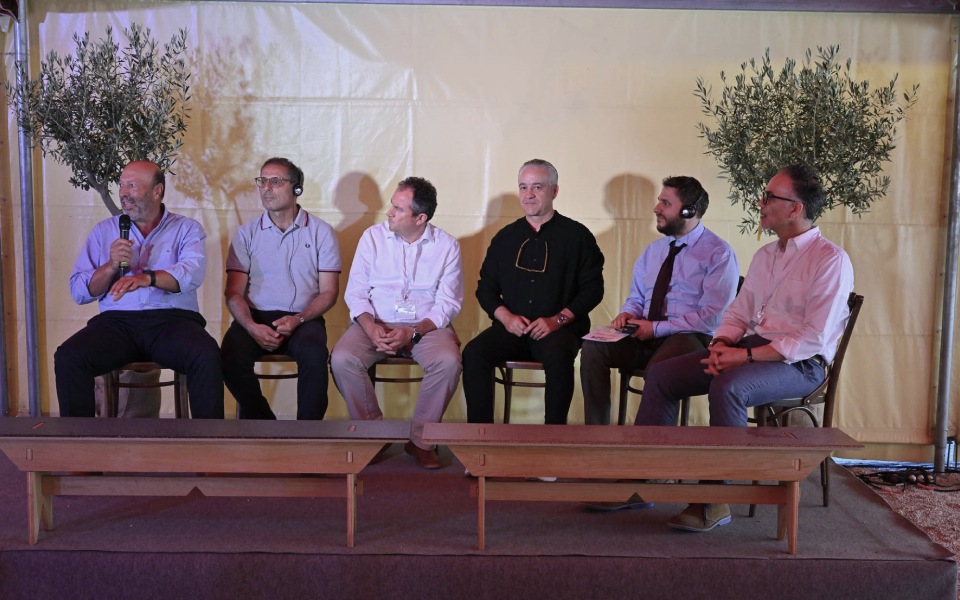The 2nd International ELIA Lesvos Confest (an olive conference and festival) took place at the Vrana Olive Press Museum on the island of Lesvos in Greece May 23-26. Local olive farmers joined eminent scientists, olive oil and tourism experts, and chefs to examine olive oil in terms of health, tourism, tradition, marketing, sustainability, and gastronomy.
This was neither a conventional conference nor a typical festival. Formal presentations ranged from discussions of some of the latest scientific research on olive oil’s health benefits to advice for olive oil producers on production, marketing strategies, and agrotourism. Moreover, tasting workshops, culinary masterclasses, and olive oil tourism experiences took place in the afternoons and on the last day of the Confest.
Many Confest presentations focused on the growing body of scientific evidence for extra virgin olive oil’s health benefits, especially as part of a traditional Mediterranean diet. Speakers explained that there is now evidence that extra virgin olive oil (EVOO)—especially high-phenolic EVOO–has positive effects on brain health (including likely protection against Alzheimer’s) and heart health (reducing the risk of cardiovascular disease), as well as decreasing the risk of many types of cancer and numerous other serious diseases.

Scientific studies continue to investigate the antioxidant and anti-inflammatory effects of specific phenolic compounds that occur naturally in extra virgin olive oil—compounds which can now be extracted from the EVOO for potential use in food supplements.
The Confest also featured numerous discussions of various types of olive oil tourism and the ways chefs, restaurants, and hotels can present extra virgin olive oil to their customers. Presenters mentioned the benefits of olive oil tourism, such as environmental sustainability, consumer education, and increased income for individual farmers and rural communities. They described a wide range of agrotourism and food tourism activities, from harvests to tastings, and from hikes to cooking classes. These alternative tourism adventures can focus on olive oil, local gastronomy and culture, olive groves, landscapes, mills, and museums.
Panels on olive oil in gastronomy highlighted chefs’ use of extra virgin olive oil in a variety of innovative ways: in olive oil bars and displays in restaurants and hotels, on the menu both in olive oil lists and in descriptions of dishes, in guided tastings and classes in restaurants, and in olive oil sommeliers’ explanations of food pairings.
A panel on the tradition of olive cultivation over time featured the founders and owners of four olive oil companies on the island of Lesvos. Ioannis Protoulis, co-owner of Protoulis Master Olive Oil Makers, described his family’s vertically integrated production, with 17,000 trees of the traditional olive varieties of Lesvos—Kolovi, Adramitiani, and Ladolia–three olive mills, an agrotourism venture, and many international awards. The Protoulis family uses all of this to promote the culture of the olive of Lesvos because, as Protoulis says, “olives and olive oil are part of our cultural heritage.”

Michael Tzortzis, owner of Tzortzis Olive Oil Company, summarized a century-long “struggle for olive oil” in four generations of his family. These winners of many awards and exporters to 18 countries cooperate with Greek universities on research projects that aim for environmentally friendly and health-protective results.
Eirini Hatzidimitriou, founder of Mia Elia, explained that her family invites people from around the world to adopt an olive tree and thus create an environmentally-friendly bond with the island and the 11 million olive trees that have enduring cultural, aesthetic, and economic importance there. “Mia Elia means one olive tree,” she reveals, “and one olive tree means the world to us.”
Eirini Kalampoka, co-owner of Eirini Plomariou EVOO, presented her family’s award-winning organic extra virgin olive oil, visitable two-phase olive mill and bottling plant in “Lesvos, where the olive tree is the symbol of love and well-being.” Inheriting a love for the olive tree from her grandmother and parents, Kalampoka returned to the island after university to embrace the passion, honesty, commitment, health, and biodiversity that are central to her family business.
“Deeply moved” by the fourth-generation growers who paid tribute to their ancestors, renowned Mediterranean diet expert Dr. Antonia Trichopoulou pointed out that this is “the generation that will address the future but can rely on deep roots, as the Kolovi cultivar reaches water through limestone.”
In the Confest’s final panel, sustainable food and tourism expert Sotiris Di. Bampagiouris reminded the audience that olive groves are a useful asset that can help ensure the survival of societies, making them part of our connection to the future. Mill owner Antonis Tirpintiris urged olive farmers not to “give up; join us, keep your groves,” because even if olive farming does not seem profitable, carbon capture, better marketing, and EVOO’s health benefits can offer hope. Yale professor Tassos Kyriakides suggested Lesvos could “be a role model in problem solving” and called for “a round of applause for all producers, because without them we would not be here.”
University of Jaén professor Juan Antonio Parrilla González praised the Confest as an opportunity to learn and advocated additional international collaborations. Marketing, export, and olive oil tasting expert Emmanouil Karpadakis praised the active participation of chefs at the Confest, since “gastronomy has a critical role to play”; he also encouraged “thinking outside the box in order to give olive oil the place it deserves.” Temple University professor Domenico Pratico referred to the Greek myth that portrays the olive tree as a god’s gift to humans, and insisted that we should “cherish and worship this tree that is good for us for everything it can do for the environment and the human being.”
Organized by the Eleas Nisos Lesvos Cultural Association with the support of Yale University and the National and Kapodistrian University of Athens, the conference took place on the premises of the Vrana Olive Press Museum in the village of Papados Geras. The museum was originally a steam-powered olive mill built in 1887 and owned by the grandfather of the Greek poet Odysseas Elytis, a Nobel laureate. Fotini Tirpintiri, president of Eleas Nisos Lesvos, looks forward to welcoming participants to another edition of the Confest in the future.
Originally published on Greek Liquid Gold: Authentic Extra Virgin Olive Oil (greekliquidgold.com). See that site for recipes with olive oil, photos from Greece, agrotourism and food tourism suggestions, and olive oil news and information.
Thanks to the ELIA Lesvos confest for the photos used with this article, which were taken by Dimitris Talianis.
Greek Liquid Gold was a media sponsor of the ELIA Lesvos confest.
All businesses, organizations, and competitions involved with Greek olive oil, the Mediterranean diet, and/or agrotourism or food tourism in Greece, as well as others interested in supporting Greeks working in these sectors, are invited to consider the advertising opportunities on the Greek Liquid Gold: Authentic Extra Virgin Olive Oil website. The only wide-ranging English-language site focused on news and information from the Greek olive oil world, it has helped companies reach consumers in more than 220 countries around the globe.












